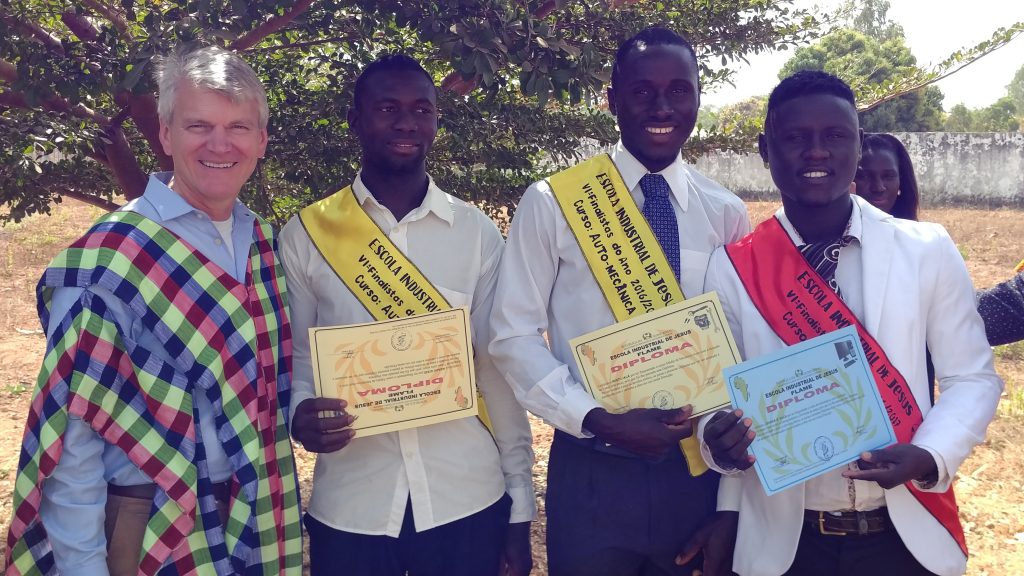
Clovis Mayor Bob Whalen is known for his passionate leadership, but his love for his hometown of Clovis has only increased since returning from his first mission trip to Guinea-Bissau in Africa earlier this year.
“I wanted to kiss the ground,” Whalen said about coming home after his weeklong trip.
A Christian, Whalen said he’s always known how blessed he is to live in Clovis, but visiting the third-world country was quite the wake-up call.
“Here, you go to turn on your faucet and water comes out; you put your garbage out and it’s going to get picked up. Your streets will be paved and generally well taken care of. You flip the switch and the light is going to come on,” Whalen said. “These things don’t happen in Guinea-Bissau.”
On day one, Whalen recalls taking a slow, bumpy journey down an unkept dirt road to an adobe style house where he had a meeting with an administrator from the WAVS (West African Vocational Schools) campus in Guinea-Bissau he was there to visit. The home had only enough space for sleeping, so Whalen was led to the backyard where a communal lunch—one big platter passed around—was served. There, as he ate with pigs and chickens roaming at his feet, at least 10 Guineans stopped by to pull up the day’s water from the host’s well.
Such were Whalen’s initial observations: no roads, no water infrastructure, no sewer system to accommodate the restrooms Westerners are accustomed too, and no electricity save for some solar power. The only modern convenience afforded to Guineans: cell phones.
“In my mind, based on my experience as mayor, it really wouldn’t take much to get things taken care of,” Whalen said. “For the roads, it would just mean grading them on a regular basis. I get that asphalt is really expensive, but just grading it would make it passable.”
But this wasn’t Clovis, this was Guinea-Bissau, and Whalen wasn’t on a mission to build infrastructure but was there as interim president of the board for WAVS—a title changed last week to simply president of the board—to see the school, watch and participate in a graduation ceremony, and discuss how to provide better education to the local Guineans.
The WAVS campus itself wasn’t like some schools where Americans come in and try to teach the locals the American ways, but Whalen said it was truly a place where “Guineans teach Guineans” with only a couple Americans on staff. Whalen said the most popular courses at the school are welding, ag mechanics, computer technology, English and French.
Welding and ag mechanics classes teach students skills needed to go out and work. Ag mechanics is especially important since the country’s largest industry is the export of its cashews. Computer courses are also popular for students hoping to land a job in one of the bigger cities.
As for English and French, Whalen said those are the universal languages of business so knowing one or both is essential for Guineans, who often grow up already speaking three languages—their tribal language, Portuguese (the common language as the area was once a Portuguese colony) and a form of Creole used as street language.
“It’s amazing how these people who come from really difficult environments are incredibly intelligent,” Whalen said. “I’m not a very good foreign language speaker, but they know multiple languages.”
In addition to being intelligent, Whalen said he was most impressed with the sense of community shared among the Guineans.
“The people in this very poor country have very little, but what they have in abundance is joy,” Whalen said. “For me, as somebody who has been blessed with material wealth certainly compared to them, to see that joy in people who don’t have that much was a life lesson I needed to re-learn and probably need to continue to re-learn.”
Whalen, who has a full plate with his work as Chief Deputy District Attorney and as Mayor, went on the trip as interim president very guarded, knowing that if he fell in love with Guinea-Bissau that he’d have to make his role as president of WAVS another permanent commitment to his schedule.
Guarded as he was, though, and after witnessing such joy, Whalen couldn’t help but fall for Guinea-Bissau and its people.
“I didn’t want to go too overboard because I knew it would take up even more of my time but Africa has a way of drawing you in and that was true for me and my experience,” he said.
Thankfully, Clovis has its own way of drawing Whalen in and, like Guinea-Bissau, Clovis also values community.
“I’ve always wondered why it is in Clovis we have this strong sense of community and we always have a mindset of how we can create opportunities for community,” Whalen said. “But, instead of thinking of it as an add-on to what we do in the city of Clovis, I have come to a fuller understanding as a result of my experience that it should be primary to what it is that we do. You can have great infrastructure and great aesthetics but if you don’t have community you are missing the core of who we are as people.”









